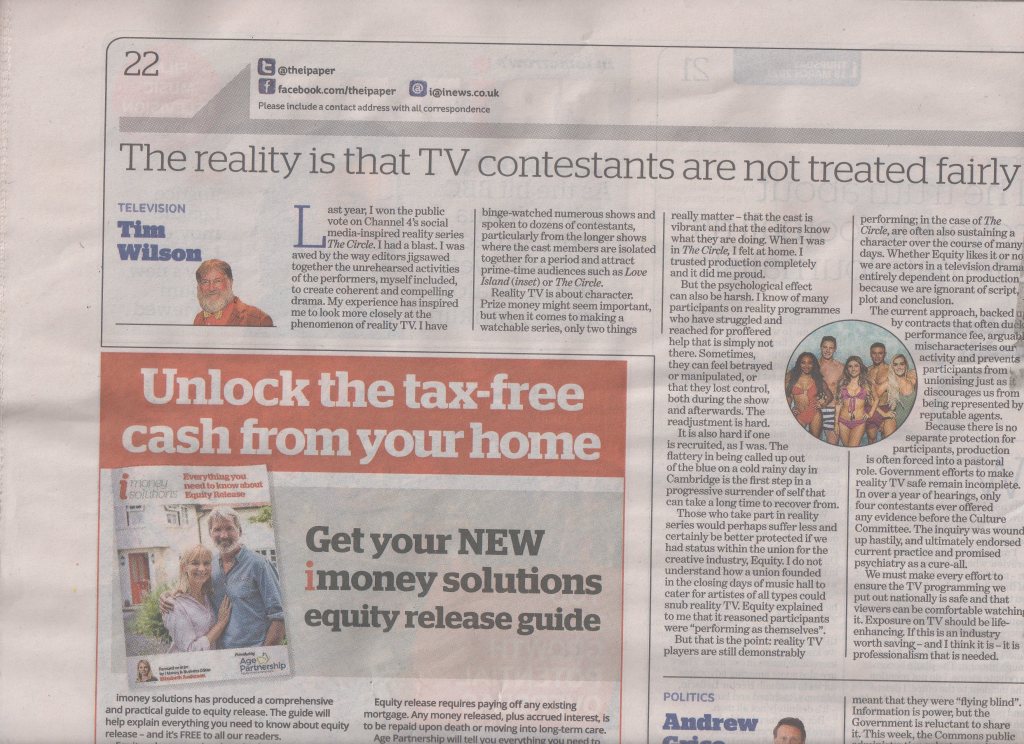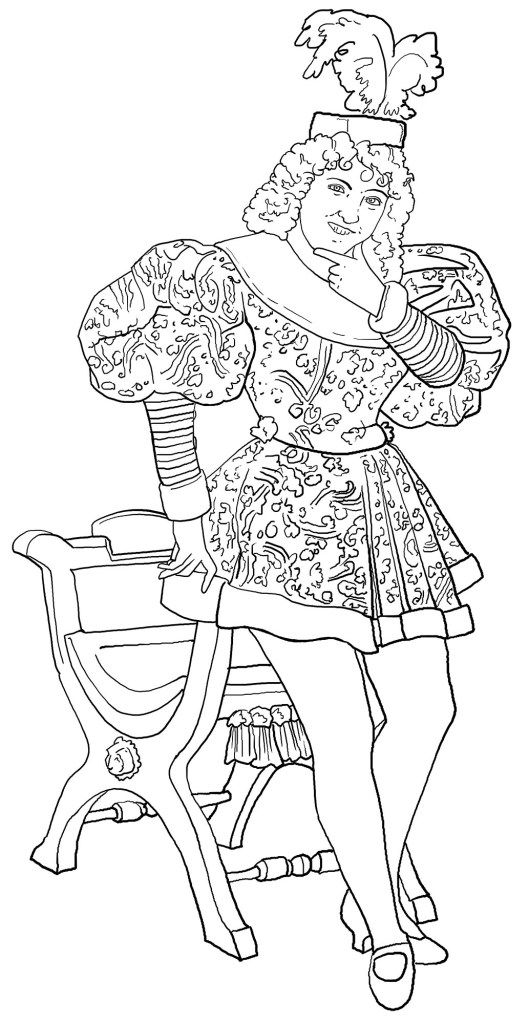There are a variety of show-formats on tv. Two are of interest because today they have been confused. One is “game show” and the other is “Reality TV”. Today, we tend to use the word “contestant” rather too readily when we talk of “Reality TV”. I would prefer to use the term “participant” or even “performer.”
I think the confusion is, in part, intentional. It is a smokescreen, all part of a much bigger magic trick.
A “game show” is about a contest and probably involves a prize. The great game shows of the past, like “Generation Game” and “Sale of the Century” exploit the skill of the host so that the contestants are simply incidental to the plot. Indeed, we rarely remember their names. (One of them was Major Tom). The prize might not be that great but the razzamatazz surrounding it is something drummed up by the charisma of the presenter. We can think particularly of the way Bob Monkhouse made the cheapest prizes seem drool-worthy.
Other game shows would include “Mastermind”, “University challenge”, “Catchphrase”, “the Price is right” and so on, going back to Bruce Forsyth and “Sunday night at the London Palladium”. Many of these shows drew on American formats, some were home grown- all made compelling viewing, partly because ordinary people were celebrated in a minor but significant role on the tv. And, in so many cases, those ordinary people had a great time going away with a token “blankety Bank chequebook and pen”.
Reality TV, in contrast, drew on the game show formula as a Mcguffin to drive the story and provide some sort of energy and direction. I think that most Reality TV falls into two quite different categories and neither is really a “game show” as such.
The first is the “fly on the wall” documentary (like the family) and the second is the heavily produced format like “Big Brother” or indeed the show I know best, “the circle”. It would be wrong to think of this latter category as a slice of genuine “reality”. Instead, it is a contrived situation that showcases a drama that is itself completely arranged and edited by production even if individual performers may be able, briefly to hijack the plot. That is not to say that it is ever scripted or that the participants are fed lines or follow a script, but rather that the casting is sufficiantly careful that events, confrontations and scenarios can be anticipated, developed and played out in an ordered and coherent way. This is, in other words, like making “Eastenders” without telling the actors what they are supposed to say. If the camera records events 24 hours a day, the likelihood is, given enough encouragement, the participants will finally say exactly what is expected of them. Some may call this “manipulation” others would call it “production”.
Of course, there is always the possibility that something better will crop up as cameras roll and I am sure that a good production company will adapt and amend their scenarios to showcase a brilliant performance or one, rather that production can use to good effect. I am pretty sure, for example, I was never expected to stay in “the circle” beyond a couple of weeks at most. I have to salute the great and imaginative Tim Harcourt for thinking on the hoof of giving me an Alpine Horn and instructing me to dance. Production may not have known when they cast me that I would throw myself into anything – but I will and I very much wanted the show to be the success it was.
The idea that this form of TV is about a prize or cash-gift is frankly farcical though inevitably the cast is persuaded to say that this is the reason they are “playing”. This is the reason they “applied” to be on the show. I balked at doing this- it seemed like greed and it seemed absurd: I was never winner material for one of these shows.
And, in most cases, as I have said repeatedly, these performers did not “apply”. They were recruited from social media platforms, youtube, modelling agencies and so on. The producers know exactly what sort of mix they want and who they are looking for in order to spark the drama they intend to create. This is a magic trick and we, the “participants” are a glorified version of the legendary Debbie McGee. Paul Daniels’ show would never work without her collaboration and these “Reality” shows would not work without the willing participation of the cast of “participants”, all signed up to NDAs and promising not to reveal the way the show works.
That would be fine if that was as far as it went. But the production companies have grown in influence and power and what seems to happen today is a level of manipulation and bullying that has made particiupation in Reality TV almost intollerable and goes on long after the show has been filmed and aired. The catalogue of suicide that dogs these shows should be no surprise because the participants have been party to a cruel joke, have often been signed up to a gagging clause but, more than that, have been prevented from seeking proper representation, professional help or support from anyone outside the suffocating control of the production offices.
I have spent a year feeling stifled and deceived. Instead of the secrecy and the knowing wink that dear Debbie might give to her husband Paul Daniels, we are controlled and fenced in lest we give away the secret of the show, assuming we have worked out what that is! We are treated as untrustworthy, we are unpaid fodder. We are treated like the poodle in a dog act, rather than the magician’s assistant. I will not play the poodle.
I would like to celebrate the new seasons of “the Circle” but I can only do so by celebrating what I know is good. This is the brilliant concept, the astonishingly clever editing, the direction, the story-telling and the trust that we, the “participants” place in the producers, the voice of God and the camera crew on a 24 hour basis. This is a magic show of the highest quality. There is no choice, or precious little: it is like being offered a card by a first-rate magician. There is no choice- I am palmed off with exactly what the magician intends that I should select.

https://podcasts.apple.com/ie/podcast/one-year-on-with-tim-wilson/id1479619134?i=1000499889520
In this way, six months’ ago, I predicted the winner of Season 3 of “the Circle”. I am absolutely convinced that my prediction is correct, although at the moment, as I write, there is no one in “the Circle” cast who conforms to the description I have given! That will not stop my conviction, believe me. So I wait to see if I am right.
This is not, in any way, to downplay the parts played by the other participants- whether they have been persuaded to “catfish” as a nurse or as an “uncle”, or whatever. All, in their own right, are giving astonishing performances. They are, whether they know it or not, performing as themselves. And that, take it from me, as someone who has done this job, is not an easy call.
I think, however, Participants should be paid properly for providing first-class entertainment. I think they should have proper theatrical representation and proper union support. This is not a business that can be sorted out with the magic wave of Psychiatry, however much I fully support what Pyschiatrists and psychologists do for us. Until we acknowledge what is really going on, we shall continue to have problems. But to pretend that “Reality TV” is a super-Game show is to live in a fantasy, or to be like the child who marvels at a Paul Daniels’ trick and thinks that it is “reality”. It is a trick. There is no shame in a magician’s trick. It is not a conspiracy: it is magic! And it is deserving of applause. It would be deceitful if we passed it off as “Reality”.
There is only so long people will believe a lie.
“Reality TV” is a business that needs to clean up its act before anyone else is hurt. I have personally asked senior management in Studio Lambert, who made “the Circle” to join me now and to lead the way in making the industry demonstrably safe. In a conversation I had last night, they acknowledged it was even worse in the past but hinted that there is still room to make it better. I take heart from that. While people are still dying, while people are still in despair after doing these shows, or angry, or lost, we know “Reality TV” is still doing damage to the performers they use. I hope, therefore, that others will respond to my offer and that we can make TV safe.





